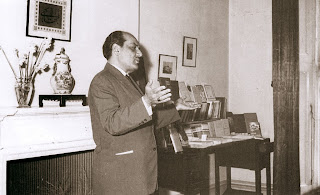'O my God! Refresh and gladden my spirit, purify
my heart, illuminate my mind. I lay all my affairs in Thy hands. Thou art my
Guide and Refuge. I'll no longer be sorrowful or grieved, I’ll be happy and
joyful. O God! I will no longer be full of anxiety nor will I let troubles
harass me. I will not dwell on the unpleasant things of life. O God! Thou art
kinder to me than I am to myself. I dedicate my life to Thee, O God!'
At 4:15 in the afternoon of November 16th, 1901, ‘Abdu’l-Baha
entered our room and greeted us. We had just arrived at His Holy household in
the prison city of Acca, Syria having traveled in a carriage driven by two
horses along the shore of the Mediterranean from Haifa. ‘Abdu’l-Baha said: 'Welcome, my boys', and chanted a prayer for my brother Wendell and me. Wendell
was 18 and I was 21 September 6, 1901. My father Arthur Pillsbury Dodge had
arranged the trip for us. At that time, ‘Abdu’l-Baha was a prisoner of the
Turkish government. But He was allowed the freedom of the city. His home was in
the original section of the city enclosed by a high wall. As Acca increased in
population a second high wall was build around the city. Finally a third high
wall enclosed the entire area.
Before we could enter Acca, it was necessary to obtain a
recommendation from the United States government. This requirement was in
addition to the usual passport. ‘Abdu’l-Baha was such a living example of love
and humility that the government officials, became friendly with Him. General
Badri Beg of the Turkish army was the frequent guest at dinner with ‘Abdu’l-Baha,
while we were there.
We stayed with ‘Abdu’l-Baha in His household 19 days:
November 16th, 1901 to December 4th, 1901. Every day breakfast was served to us
in our room. The noon day meal and the evening dinner we had with ‘Abdu’l-Baha
at His table. Generally about 16 Persian believers attended each meal, making
19 present. In the Holy Land at that time women did not eat with men when
others than the family were present. Each morning after breakfast ‘Abdu’l-Baha
came to our room and greeted us. He was gracious, considerate and always
concerned with our comfort. At every meal ‘Abdu’l-Baha gave us lessons and
allowed us plenty of time to record His remarks in our notebooks.
